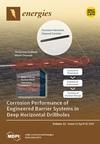Direct CO2 Hydrogenation over Bifunctional Catalysts to Produce Dimethyl Ether—A Review
IF 3
4区 工程技术
Q3 ENERGY & FUELS
引用次数: 0
Abstract
Hydrogenation of CO2 represents a promising pathway for converting it into valuable hydrocarbons and clean fuels like dimethyl ether (DME). Despite significant research, several challenges persist, including a limited understanding of reaction mechanisms, thermodynamics, the necessity for catalyst design to enhance DME selectivity, and issues related to catalyst deactivation. The paper provides a comprehensive overview of recent studies from 2012 to 2023, covering various aspects of CO2 hydrogenation to methanol and DME. This review primarily focuses on advancing the development of efficient, selective, and stable innovative catalysts for this purpose. Recent investigations that have extensively explored heterogeneous catalysts for CO2 hydrogenation were summarized. A notable focus is on Cu-based catalysts modified with promoters such as Zn, Zr, Fe, etc. Additionally, this context delves into thermodynamic considerations, the impact of reaction variables, reaction mechanisms, reactor configurations, and recent technological advancements, such as 3D-printed catalysts. Furthermore, the paper examines the influence of different parameters on catalyst deactivation. The review offers insights into direct CO2 hydrogenation to DME and proposes paths for future investigation, aiming to address current challenges and advance the field.在双官能催化剂上直接氢化二氧化碳以生产二甲醚--综述
二氧化碳加氢是将其转化为有价值的碳氢化合物和二甲醚(DME)等清洁燃料的有效途径。尽管开展了大量研究,但仍存在一些挑战,包括对反应机理和热力学的了解有限、设计催化剂以提高二甲醚选择性的必要性以及与催化剂失活相关的问题。本文全面综述了从 2012 年到 2023 年的最新研究,涵盖了二氧化碳加氢制甲醇和二甲醚的各个方面。本综述主要侧重于推进高效、选择性和稳定性创新催化剂的开发。综述了近期广泛探索用于二氧化碳加氢的异质催化剂的研究。值得注意的重点是使用 Zn、Zr、Fe 等促进剂改性的铜基催化剂。此外,本文还深入探讨了热力学因素、反应变量的影响、反应机理、反应器配置以及最近的技术进步,如三维打印催化剂。此外,本文还探讨了不同参数对催化剂失活的影响。综述深入探讨了二氧化碳直接加氢制二甲醚的过程,并提出了未来的研究方向,旨在应对当前的挑战并推动该领域的发展。
本文章由计算机程序翻译,如有差异,请以英文原文为准。
求助全文
约1分钟内获得全文
求助全文
来源期刊

Energies
ENERGY & FUELS-
CiteScore
6.20
自引率
21.90%
发文量
8045
审稿时长
1.9 months
期刊介绍:
Energies (ISSN 1996-1073) is an open access journal of related scientific research, technology development and policy and management studies. It publishes reviews, regular research papers, and communications. Our aim is to encourage scientists to publish their experimental and theoretical results in as much detail as possible. There is no restriction on the length of the papers. The full experimental details must be provided so that the results can be reproduced.
文献相关原料
| 公司名称 | 产品信息 | 采购帮参考价格 |
|---|
 求助内容:
求助内容: 应助结果提醒方式:
应助结果提醒方式:


